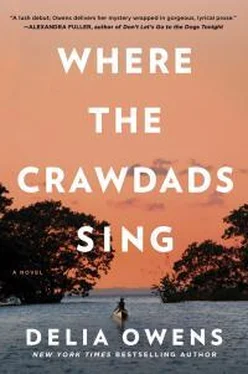“Right, we need to go back out there, look for tread marks besides ours and the ambulance. May have overlooked something.”
After a minute more of reading, Ed said, “Anyway, I’m confident now, this was no accident.”
Joe said, “I agree, and not just anybody can wipe up tracks this good.”
“I’m hungry. Let’s go by the diner on the way out there.”
“Well, get ready for an ambush. Everybody in town’s pretty riled up. Chase Andrews’s murder’s the biggest thing’s happened ’round here, maybe ever. Gossip’s goin’ up like smoke signals.”
“Well, keep an ear out. We might pick up a tidbit or two. Most ne’er-do-wells can’t keep their mouths shut.”
A full bank of windows, framed by hurricane shutters, covered the front of the Barkley Cove Diner, which overlooked the harbor. Only the narrow street stood between the building, constructed in 1889, and the soggy steps of the village pier. Discarded shrimp baskets and wadded-up fishing nets lined the wall under the windows, and here and there, mollusk shells littered the sidewalk. Everywhere: seabird cries, seabird dung. The aroma of sausage and biscuits, boiled turnip greens, and fried chicken thankfully overtook the high smell of fish barrels lining the dock.
A mild bustle spilled out when the sheriff opened the door. Every booth—high-backed with red padded upholstery—was taken, as were most of the tables. Joe pointed to two empty stools at the soda fountain counter, and the two walked toward them.
On the way they heard Mr. Lane from the Sing Oil saying to his diesel mechanic, “I reckon it was Lamar Sands. Ya r’member, he caught his wife doin’ a number wif Chase right on the deck of his fancy ski boat. There’s motive, and Lamar’s had other run-ins wif tha law.”
“What run-ins?”
“He was wif that bunch that slit the sheriff’s tars.”
“They were just kids back then.”
“Thar was sump’m else too, I just cain’t r’member.”
Behind the counter, owner-cook Jim Bo Sweeny darted from flipping crab cakes on the griddle to stirring a pot of creamed corn on the burner to poking chicken thighs in the deep fryer, then back again. Putting piled-high plates in front of customers in between. People said he could mix biscuit dough with one hand while filleting a catfish with the other. He offered up his famous specialty—grilled flounder stuffed with shrimp served on pimento-cheese grits—only a few times a year. No advertising needed; word got out.
As the sheriff and deputy wove among the tables toward the counter, they heard Miss Pansy Price of Kress’s Five and Dime say to a friend, “It coulda been that woman lives out in the marsh. Crazy ’nough for the loony bin. I jus’ bet she’d be up to this kinda thing . . .”
“What d’ya mean? What’d she have to do with anything?”
“Well, for a while thar, she was got herself involved wif . . .”
As the sheriff and deputy stepped up to the counter, Ed said, “Let’s just order take-out po’boys and get out of here. We can’t get dragged into all this.”
9. Jumpin’
1953
Sitting in the bow, Kya watched low fingers of fog reaching for their boat. At first, torn-off cloud bits streamed over their heads, then mist engulfed them in grayness, and there was only the tick, tick, tick of the quiet motor. Minutes later, small splotches of unexpected color formed as the weathered shape of the marina gas station eased into view, as though it and not them was moving. Pa motored in, bumping gently against the dock. She’d only been here once. The owner, an old black man, sprang up from his chair to help them—the reason everybody called him Jumpin’. His white sideburns and salt-and-pepper hair framed a wide, generous face and owl eyes. Tall and spare, he seemed to never stop talking, smiling, or throwing his head back, lips shut tight in his own brand of laugh. He didn’t dress in overalls, like most workmen around, but wore an ironed blue button-down shirt, too-short dark trousers, and work boots. Not often, but now and then on the meanest summer days, a tattered straw hat.
His Gas and Bait teetered on its own wobbly wharf. A cable ran from the closest oak on shore, about forty feet across the backwater, and held on with all its might. Jumpin’s great-grandpa had built the wharf and shack of cypress planks way back before anybody could remember, sometime before the Civil War.
Three generations had nailed bright metal signs—Nehi Grape Soda, Royal Crown Cola, Camel Filters, and twenty years’ worth of North Carolina automobile license plates—all over the shack, and that burst of color could be seen from the sea through all but the thickest fog.
“Hello, Mister Jake. How ya doin’?”
“Well, Ah woke up on the right side of dirt,” Pa answered.
Jumpin’ laughed as if he’d never heard the worn-out phrase. “Ya got your li’l daughter with you an’ all. That’s mighty fine.”
Pa nodded. Then, as an afterthought, “Yep, this here’s ma daughter, Miz Kya Clark.”
“Well, I’m mighty proud to know ya, Miss Kya.”
Kya searched her bare toes but found no words.
Jumpin’ wasn’t bothered and kept talking about the good fishing lately. Then he asked Pa, “Fill ’er up then, Mister Jake?”
“Yeah, slam ’er right up to tha top.”
The men talked weather, fishing, then more weather till the tank was full.
“Good day to y’all, now,” he said, as he tossed off the line.
Pa cruised slowly back onto a bright sea—the sun taking less time to devour the fog than it took Jumpin’ to fill a tank. They chugged around a piney peninsula for several miles to Barkley Cove, where Pa tied to the deeply etched beams of the town wharf. Fishermen busied about, packing fish, tying line.
“Ah reckon we can git us some rest’rant vittles,” Pa said, and led her along the pier toward the Barkley Cove Diner. Kya had never eaten restaurant food; had never set foot inside. Her heart thumped as she brushed dried mud from her way-too-short overalls and patted down her tangled hair. As Pa opened the door, every customer paused midbite. A few men nodded faintly at Pa; the women frowned and turned their heads. One snorted, “Well, they prob’ly can’t read the shirt and shoes required .”
Pa motioned for her to sit at a small table overlooking the wharf. She couldn’t read the menu, but he told her most of it, and she ordered fried chicken, mashed potatoes, gravy, white acre peas, and biscuits fluffy as fresh-picked cotton. He had fried shrimp, cheese grits, fried “okree,” and fried green tomatoes. The waitress put a whole dish of butter pats perched on ice cubes and a basket of cornbread and biscuits on their table, and all the sweet iced tea they could drink. Then they had blackberry cobbler with ice cream for dessert. So full, Kya thought she might get sick, but figured it’d be worth it.
As Pa stood at the cash register paying the bill, Kya stepped out onto the sidewalk, where the ripe smell of fishing boats hung over the bay. She held a greasy napkin wrapped around the leftover chicken and biscuits. Her overalls pockets were stuffed with packages of saltines, which the waitress had left right on the table for the taking.
“Hi.” Kya heard a tiny voice behind her and turned to see a girl of about four years with blond ringlets looking up at her. She was dressed in a pale blue frock and reached out her hand. Kya stared at the little hand; it was puffy-soft and maybe the cleanest thing Kya had ever seen. Never scrubbed with lye soap, certainly no mussel mud beneath the nails. Then she looked into the girl’s eyes, in which she herself was reflected as just another kid.
Kya shifted the napkin to her left hand and extended her right slowly toward the girl’s.
Читать дальше











